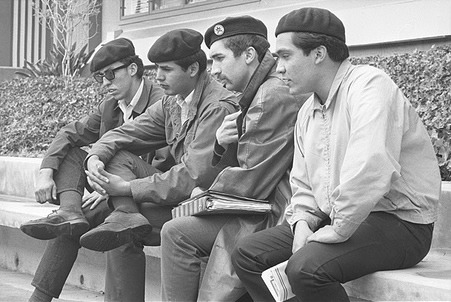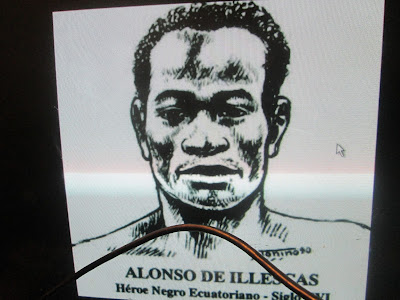Disclaimer: The title “Blacks and Latinos is just that, a title. Realistically, Black people come in many different cultures, including Latino, and Latinos come in many different races, including black.
Last night, I was so deeply touched watching a movie about César Chávez that I wanted to jump through the screen and hug the actor who played the role of this great civil rights leader, and how he so eloquently handled the same rednecks who oppress black folks. It was like watching a film documentary of the black civil rights movement.
For me, it is plain and simple that despite the cultural differences between black and brown people in this country, we inadvertently are being confronted by critical issues based on race and ethnicity, and it would behoove both communities to put their illogical and ludicrous animosities aside and align to confront these issues.
Now, before any black or Latino haters start articulating venom against each other, I would implore you to read the rest of this blog post because it is filled with historical facts that you should know.
As brothers in the fight for equality, I extend the hand of fellowship and good will and wish you continuing success to you and your members. You and your valiant fellow workers have demonstrated your commitment to writing grievous wrongs forced upon exploited people. We are together with you in spirit and in determination that our dreams for a better tomorrow will be realized.
 The Mexican-American allies of the Black Panther Party, the Brown Berets, was formed in the barrios of California and the U.S. Southwest with similar struggles for self determination and social justice.
At the State University of New York at Albany where I was a member of the Black Student Alliance, we were so successful in increasing the enrollment of Latinos as well as blacks, among other accomplishments, that we had to drop the Black Student Alliance name in exchange for one that included all people of color.
Meanwhile, in New York City, black students from varying ethnic groups, and Puerto Ricans of all colors came together in one united front to make positive changes at the City University of New York.
Sadly, gone are the days when the Black Panthers were allies with the Puerto Rican Young Lords Party and the Mexican-American Brown Berets as they were all infiltrated and crushed by the FBI's Counter-Intelligence Program.
The Mexican-American allies of the Black Panther Party, the Brown Berets, was formed in the barrios of California and the U.S. Southwest with similar struggles for self determination and social justice.
At the State University of New York at Albany where I was a member of the Black Student Alliance, we were so successful in increasing the enrollment of Latinos as well as blacks, among other accomplishments, that we had to drop the Black Student Alliance name in exchange for one that included all people of color.
Meanwhile, in New York City, black students from varying ethnic groups, and Puerto Ricans of all colors came together in one united front to make positive changes at the City University of New York.
Sadly, gone are the days when the Black Panthers were allies with the Puerto Rican Young Lords Party and the Mexican-American Brown Berets as they were all infiltrated and crushed by the FBI's Counter-Intelligence Program.
 Afro-Puerto Rican Felipe Luciano headed the New York Branch of the Young Lords Party applying the same work as the Black Panthers in the Puerto Rican community. Luciano was the original member of the Last Poets, a trio of revolutionary poets and drummer addressing political and social issues in the black community.
In 1982, Cha Cha Jimenez, leader of the Chicago Young Lords Party galvanized the Puerto Rican community to help elect Harold Washington as Chicago's first black mayor. After the election, Jimenez introduced Washington to over 100,000 Puerto Ricans at a celebratory event sponsored by the Young Lords.
Afro-Puerto Rican Felipe Luciano headed the New York Branch of the Young Lords Party applying the same work as the Black Panthers in the Puerto Rican community. Luciano was the original member of the Last Poets, a trio of revolutionary poets and drummer addressing political and social issues in the black community.
In 1982, Cha Cha Jimenez, leader of the Chicago Young Lords Party galvanized the Puerto Rican community to help elect Harold Washington as Chicago's first black mayor. After the election, Jimenez introduced Washington to over 100,000 Puerto Ricans at a celebratory event sponsored by the Young Lords.
Also, gone are the days when the black Student Non-violent Coordinating Committee (SNCC) allied with Movimiento Estudiantil de Atzlan (MEChA), a Mexican-American student organization on college campuses. I cite narrow-mindedness on both sides.
Some years back, I attended a lecture at the La Peña Cultural Center in Berkeley, CA where the Mexican-American presenter spoke of Mexicans being lynched during the same time period when black Americans were regularly lynched. Although, this was the first I heard of such a horror happening to Latinos, I was not one bit surprised.
After the death of Martin Luther King, César Chávez became friends with Coretta Scott King and other leaders of the black civil rights movement in recognition of a common struggle.
Mexican Americans, like African Americans, were not only lynched for being “uppity,” taking jobs away from whites, and accused of making advances toward white women, but were also lynched for acting too “Mexican,” i.e., speaking Spanish too loudly and proudly showing off aspects of Mexican culture.
During slavery, Mexican Americans took great risks and invested in enormous resources to facilitate the escape of enslaved blacks creating the little-known underground railroad south of the border. , the In my post Mexico's Historic Aid to the Black American Freedom Struggle, I added that that the half black, half mestizo president of Mexico Vicente Guerrero, who abolished slavery in his country, steadfastly refused to comply with the demands of American slave holders to return runaway slaves who escaped to Mexico.
In the events of perpetual police misconduct in the U.S. where blacks and Latinos are targets, I strongly believe that protesters from both communities need to make their presence known simultaneously, such as what occurred in San Francisco when blacks were protesting the murder of a black youth while Latinos came out in protest of police murdering Latino members of their community. As the saying goes, “there is strength in numbers.”
It is my utmost conviction that, despite cultural differences, black and brown people need to come together under one umbrella confronting common causes as we so often have done in the past.












